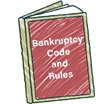A Chapter 7 bankruptcy case offers clients a chance to eliminate most or all of their debts, giving them a fresh financial start. This option is particularly effective for addressing significant credit card debt and other unsecured debts, such as personal loans and medical bills. For those struggling with current obligations, creditor harassment, collection activities, and poor credit, Chapter 7 can provide significant relief.
i) Initiating a Chapter 7 Case and the “Automatic Stay” The Chapter 7 case starts with filing a bankruptcy petition, schedules, and a statement of financial affairs with the court. These documents outline the client’s assets, liabilities, income, and expenses. During an intake session, the law firm gathers required information, including bank statements, tax returns, income verification, and bills. Prior to filing, the client must complete a pre-filing credit counseling session. Once filed, an “automatic stay” goes into effect, halting creditor collection efforts, wage garnishments, and bank account restrictions.
ii) Issue of Potential “Equity” in Assets A Chapter 7 trustee will assess if any assets have equity that could be sold to repay creditors. Most cases are “no asset” if the client’s assets aren’t valuable enough to cover creditors’ claims. Certain exemptions, such as New York’s homestead exemption, safeguard the client’s property, including up to $150,000 of equity in their home.
iii) Issue of “Avoidable Transfers” “Avoidable transfers” can complicate Chapter 7 cases. These include preferential payments to creditors made within 90 days before filing or transfers to family members for less than fair value within a year. Trustees can challenge and reverse these transfers under bankruptcy law.
iv) Income Level Considerations To qualify for Chapter 7, a client must pass the means test, which evaluates income relative to household size and necessary expenses. If the client’s income exceeds the state’s median, a detailed review of allowable expenses may still allow eligibility. If the client doesn’t qualify, Chapter 13 bankruptcy may be considered as an alternative.
v) Issue of “Abusive” Debt Creditors may investigate large cash advances or balance transfers made shortly before filing for bankruptcy. In such cases, it may be advisable to wait before filing to avoid complications in the process.
vi) Avoiding Judicial Liens Against the Client’s Home If a creditor has placed a judicial lien on the client’s property, a motion can be filed to avoid it in Chapter 7. This helps preserve the homestead exemption and prevents the lien from impacting the client’s ability to retain their home.
vii) Concluding a Bankruptcy Case and the Bankruptcy “Discharge” The main objective of Chapter 7 is to receive a discharge, which legally forgives most of the client’s debts, except for student loans, most taxes, and child or spousal support.
viii) Benefits of Chapter 7 and Our Law Office’s Role Chapter 7 is a popular choice for those burdened with debt because it provides fast relief—usually in just four months. It can help eliminate excessive credit card debt and other unsecured debts. However, Chapter 7 cases can be complex, especially when issues like equity, income, or avoidable transfers arise. Having an experienced bankruptcy attorney, like the Law Office of Ronald D. Weiss, P.C., is essential to navigate these complexities and ensure a smooth process.
We frequently represent clients from Queens and New York, helping them discharge overwhelming credit card debt. Our firm offers comprehensive guidance and support throughout the Chapter 7 bankruptcy process, helping clients move forward with financial relief.














